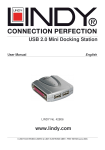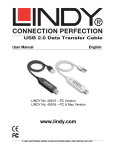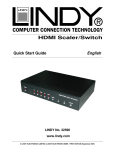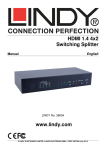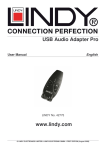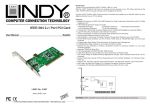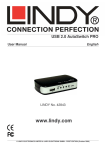Download Lindy 32538 video splitter
Transcript
Introduction Thank you for purchasing one of the products from our CAT5 VGA Extender range. With a LINDY CAT5 VGA Extender you can locate your monitor(s) up to 300m away from your computer. This manual covers the following products: CAT5 VGA Extenders English User Manual LINDY CAT5 VGA Extender LINDY CAT5 VGA Extender & Splitter , 8 Port LINDY CAT5 VGA Extender, Remote Unit The CAT5 VGA Extender system is made up of a transmitter (local) and a receiver (remote) unit that are connected together by CAT5 twisted pair cable (not included). The remote receiver unit connects to your distant monitor(s); the local transmitter unit connects to the computer system’s video port and, optionally, to a secondary local monitor. The CAT5 VGA Extender (No. 32537) is supplied with both a transmitter and receiver unit; the CAT5 Extender & Splitter (No. 32538) consists of a transmitter only and requires up to 8 additional remote units (No. 32539) which must be purchased separately according to your requirements. Package Contents LINDY CAT5 VGA Extender, No. 32537 CAT5 VGA Extender, Local Transmitter Unit CAT5 VGA Extender, Remote Receiver Unit 2 x power supplies, 12V DC, 1.25A 1.2m VGA cable (15 Way HD Male to 15 Way HD Male) This manual LINDY CAT5 8 Port VGA Extender & Splitter, No. 32538 CAT5 VGA Extender & Splitter, 8 Port, Local Transmitter Unit Power supply, 12V DC, 1.25A 1.2m VGA cable (15 Way HD Male to 15 Way HD Male) This manual LINDY CAT5 VGA Extender, Remote Receiver Unit, No. 32539 LINDY No’s 32537, 32538, 32539 www.lindy.com © LINDY ELECTRONICS LIMITED & LINDY-ELEKTRONIK GMBH - FIRST EDITION (June 2006) No. 32537 No. 32538 No. 32539 CAT5 VGA Extender, Remote Unit Power supply, 12V DC, 1.25A This manual Product Information Installation Examples CAT5 8 Port VGA Extender & Splitter Transmitter Unit Local monitor CAT5 VGA Extender Receiver Unit Mac or PC This example shows how a single video output can be extended by up to 300m using the CAT5 VGA Extender Transmitter and Remote units. Remote monitor Up to 300m using CAT5 cable The example below shows how a single video output can be extended by up to 300m to multiple displays using the 8 Port VGA Extender & Splitter. Each remote monitor is connected via CAT5 cable and a Remote Receiver unit. CAT5 VGA Extender Transmitter Unit Up to 8 remote monitors Distances and Resolutions when using CAT5/5e and CAT6 cable For best results, we recommend you use CAT5 cable. The table below shows the typical resolutions and distances you can expect to achieve when using the various types of cable. Local monitor Mac or PC Cable CAT5/5e CAT6 Distance 50m 100m 150m 200m 300m 30m 50m 100m Resolution 2048 x 1536 1280 x 1024 1024 x 768 800 x 600 640 x 480 1920 x 1440 1280 x 1024 800 x 600 Up to 300m using CAT5 cable CAT5 VGA Extender, Remote Unit Product Connections & Installation Make the following relevant connections BEFORE powering up your computer and monitor(s) Plug the remote monitor into this VGA IN port CAT5 VGA Extender, Local Transmitter Unit Use the supplied VGA cable to connect the VGA output from your computer to this INPUT port Connect the CAT5 cable to this RJ-45 port Connect the power supply to this socket Connect the power supply to this socket Connect the CAT5 cable to this RJ-45 port The Power LED will illuminate when the power is connected Adjusting the Remote Monitor Picture Quality The Power LED will illuminate when the power is connected Plug a local monitor into this OUTPUT port EQ: Equalisation adjustment (sharpens the picture) GAIN: Adjusts picture brightness CAT5 VGA 8 Port Extender & Splitter Plug a local monitor into this OUTPUT port On the base of the unit, the CAT5 VGA Extender Remote provides controls for adjusting and improving the picture quality of the connected remote monitor. Use the supplied VGA cable to connect the VGA output from your computer to this INPUT port Connect the power supply to this socket A good method to check and adjust the picture quality is to display a high contrast image, with vertical edges, on the remote screen. Launch a word processor and type a large capital ‘H’ in the centre of the screen. Use a bold black font, with a size of 72 points or higher, on a white background. The Power LED will illuminate when the power is connected Connect one CAT5 cable for each remote monitor, to these RJ-45 ports Using a Philips screwdriver, adjust the EQ control until any shadowing effect, as illustrated on the left hand side, is reduced to an acceptable level, as on the right. Adjust the GAIN control until you achieve a satisfactorily bright picture. WEEE (Waste of Electrical and Electronic Equipment), Recycling of Electronic Products United Kingdom In 2006 the European Union introduced regulations (WEEE) for the collection and recycling of all waste electrical and electronic equipment. It is no longer allowable to simply throw away electrical and electronic equipment. Instead, these products must enter the recycling process. Each individual EU member state has implemented the WEEE regulations into national law in slightly different ways. Please follow your national law when you want to dispose of any electrical or electronic products. More details can be obtained from your national WEEE recycling agency. Germany / Deutschland Die Europäische Union hat mit der WEEE Direktive umfassende Regelungen für die Verschrottung und das Recycling von Elektro- und Elektronikprodukten geschaffen. Diese wurden von der Bundesregierung im Elektround Elektronikgerätegesetz – ElektroG in deutsches Recht umgesetzt. Dieses Gesetz verbietet vom 24.März 2006 an das Entsorgen von entsprechenden, auch alten, Elektro- und Elektronikgeräten über die Hausmülltonne! Diese Geräte müssen den lokalen Sammelsystemen bzw. örtlichen Sammelstellen zugeführt werden! Dort werden sie kostenlos entgegen genommen. Die Kosten für den weiteren Recyclingprozess übernimmt die Gesamtheit der Gerätehersteller. CE Statement This device complies with the European Regulations for Electromagnetic Compatibility (EMC) of the European Union and it is equipped with the CE mark. This unit has to be used with high quality shielded connection cables. Only if these high quality shielded cables are used can it be sure that the EMC compatibility is not adversely influenced. FCC Statement Shielded cables must be used with this equipment to maintain compliance with radio frequency energy emission regulations and ensure a suitably high level of immunity to electromagnetic disturbances. FCC Warning This equipment has been tested and found to comply with the limits for a Class B Digital device, pursuant to part 15 of the FCC Rules. These limits are designed to provide reasonable protection against harmful interference in a residential installation. This equipment generates, uses, and can radiate radio frequency energy and, if not installed and used in accordance with the instructions, may cause harmful interference to radio communications. However, there is no guarantee that interference will not occur in a particular installation. If this equipment does cause harmful interference to radio or television reception, which can be determined by turning the equipment off and on, the user is encouraged to try to correct the interference by one or more of the following measures: Reorient or relocate the receiving antenna Increase the separation between the equipment and receiver Connect the equipment into an outlet on a circuit different from that to which the receiver is connected Consult the dealer or an experienced technician for help You are cautioned that changes or modifications not expressly approved by the party responsible for compliance could void your authority to operate the equipment. France En 2006, l' union Européenne a introduit la nouvelle réglementation (WEEE) pour le recyclage de tout équipement électrique et électronique. Chaque Etat membre de l’ Union Européenne a mis en application la nouvelle réglementation WEEE de manières légèrement différentes. Veuillez suivre le décret d’application correspondant à l’élimination des déchets électriques ou électroniques de votre pays. Italy Nel 2006 l’unione europea ha introdotto regolamentazioni (WEEE) per la raccolta e il riciclo di apparecchi elettrici ed elettronici. Non è più consentito semplicemente gettare queste apparecchiature, devono essere riciclate. Ogni stato membro dell’ EU ha tramutato le direttive WEEE in leggi statali in varie misure. Fare riferimento alle leggi del proprio Stato quando si dispone di un apparecchio elettrico o elettronico. Per ulteriori dettagli fare riferimento alla direttiva WEEE sul riciclaggio del proprio Stato. LINDY No’s 32537, 32538, 32539 1st Edition June 2006 www.lindy.com




